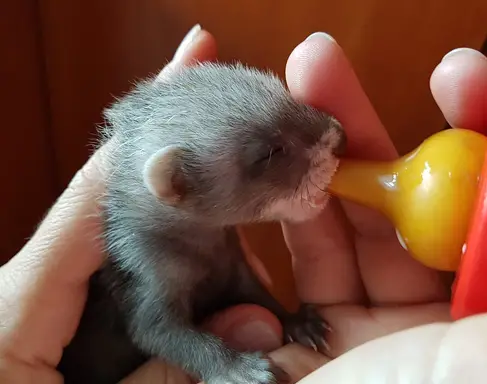Pet Ferrets Lifespan and how to make them live longer ?
Pet ferrets that are well cared for can live for more than 10 years, slightly less than their close European wild cousin (Mustela putorius) which can live in captivity for more than 13 years. Wild ferrets rarely live more than 5 years.
Ferrets Life Cycle

Ferrets birth & childhood
At birth, ferrets are deaf, blind and toothless, they are about 3 inches tall and weigh about 15 grams.
Before the end of the first month, the Kits (ferret babies) will start to develop their teeth, open their eyes and ears and will start to taste solid food in addition to their mother’s milk from about two months.
Ferrets could be weaned from the age of 3 months onwards, after she has taught them a little bit about how to behave, what to eat and what to avoid, when to sleep and when to play and after she has socialized them a little.
Teenage Ferrets
Ferrets become adult and sexually mature at around 9 to 10 months and can mate in turn at 12 months of age.
Ferrets are considered adults between 12 months and 5 years of age, they will be in their best shape during this time, going through seasonal changes in weight and sometimes even in the color of their fur.
Adult and Senior ferrets
We can talk about a senior ferret from the age of 5 to 6 years. The ferret will sleep more and move less, its coat will start to lose its shine.
His playtimes will become shorter and his health will start to deteriorate and he could be affected by diseases like Adrenal disease, lymphoma and insulinoma.
From the age of 6 years, a ferret should have regular health checks, and you should encourage your ferret to play and exercise.
Ferrets can live up to 12 years or more if certain conditions are met throughout their lives and that’s what I’m going to talk about now:
How to Make Your Ferret Live Longer ?
To ensure your ferret’s longevity, you have to start the work upstream; that is to say before he is even born and only a passionate breeder can do that.
1- Healthy ferrets are born from healthy parents:
First of all, if you want a ferret that will live as long as possible, you must buy it from a breeder who has selected its parents so that he has a litter of healthy ferrets whose genes do not contain predispositions to early diseases and malformations … etc.
An old female ferret will not give birth to ferret babies that will live long! It is therefore necessary to buy a ferret born from a young and healthy mother ferret.
2- A baby ferret ( Kit ) weaned too early will not have long life
If you want your ferret to live as long as possible, you should never wean him from his mother before the age of 3 months (12 weeks).
It’s not just a question of teeth and solid food, it’s more than that. A ferret that will stay with his mother until she finishes her socialization, her education, etc. is a ferret that will have a better mental and emotional life and this is what will considerably prolong his life and avoid him to be stressed easily, therefore to be victim of many diseases caused by stress.
3- What your ferret eats will determine its lifespan
First of all, for a ferret to be born in excellent health, its parents, especially the mother ferret, must be well fed and not like Marshall’s, she must be fed as close as possible to her natural diet (whole pre), Franken Prey or as a last resort, with Pellet Premium special ferret and not cheap cat food!
The same thing for the ferret baby and all along his life, he must be able to find milk every time he wants to suckle his mother and never be weaned prematurely
Then, for him to have a long life, he must be able to eat with his mother a healthy and appropriate solid food, a vitamin-fortified foods and a special formulations, otherwise, a combination of whole prey and Frankenprey diet is what I personally recommend.
Your ferret should be fed until he is no longer hungry and have permanent access to the leftovers of his daily ration every time he wakes up from his nap (about 8 times per day).
Water is life and you should never neglect this vital element if you want your ferret to live as long as possible. His water must be fresh and changed daily.
4- Your ferret’s lifestyle (sanitation)
A ferret that has undergone potty training and lives in a clean and well-ventilated environment will live a long time because it will avoid all the diseases that result from the poor maintenance of the ferret’s cage, bedding, litter box and its own hygiene (daily grooming especially for angora ferrets).
Your ferret’s litter box or potty pads should be changed daily, its bedding and litter box, bowls should be cleaned once a week and its cage once a month.
You must also vacuum all the rooms where your ferret has access, his playpen to collect all the food remains …
If you can’t air your ferret’s room (where his cage is installed), think about installing an air purifier to avoid bad smells and especially so that your ferret doesn’t contract respiratory diseases.
5- Regular Veterinary check ups will increase your ferret’s life expectancy
Ferrets should have their vaccines between 8 weeks and 14 weeks of age, against canine distemper, and USDA-approved rabies vaccines especially if your ferret goes out in the park often.
These vaccines will prevent zoonotic diseases if your ferret dies and will also increase his life expectancy.
Ferrets are not like other pets, who only go to the vet if they are sick!
Ferrets should have regular check ups at a vet to detect health problems before they become serious and make your ferret’s life shorter.
Ferret can contract many diseases like , Campylobacteriosis , Giardiasis , Influenza , Rabies , Ringworms , Salmonellosis … and others even deadly like sylvatic plague and sometimes even Ferret Dilated Cardiomyopathy which is responsible for sudden death in ferrets.
If you want your ferret to live more than 10 years, plan a budget of at least $500 for the vet to intervene as soon as your ferret shows signs of illness.
6- Your ferret’s habitat and accessories can affect its longevity
Free-roaming your ferret can significantly increase its life expectancy, as these animals are by nature very curious and have an exploratory temperament and they like the large space to express themselves to satisfy their needs to spend their excess energy, in the wild, they seek their food and forage to develop their burrow.
You will need a large cage (equipped, covered and installed away from humidity, heat and cold as well as drafts) for your ferret, but I advise you to also give him (after training as potty training), so give him access to as much space as possible in your home.
A ferret that plays, jumps and is happy, will live longer than a ferret that has no access to enrichment, toys, outings in the backyard, … etc
Even worse if you lock your ferret in a small cage and do not even take him out for his mandatory playtimes every day … you risk seeing him leave very mature in this case !
7- Your ferret will live longer when she/he has a cage mate
Ferrets are very social animals and they need a lot of interaction, which you and I can’t provide despite our best efforts, simply because we have our own lives on the side.
The best thing to do is to buy at least two ferrets so that they can keep each other company, play together, live together… this will increase their life expectancy.
Do neutered ferrets live longer?
Neutered ferrets have a longer life expectancy because this process is necessary and will save them from many health problems, unwanted pregnancy for ferret females, stress and all the problems created by an active sexual life.
What type of ferrets live longest?
All the types of domesticated ferrets have about the same life expectancy, White and Albino ferrets may have more health problems than the others, but apart from the European ferret, which lives in captivity for more than 12 years, all other ferrets sold as pets have a common life span that does not depend on their type, color, etc., but on the conditions I mentioned earlier in this article.
Do male or female ferrets live longer?
With the same living conditions, male and female ferrets in captivity both have the same life expectancy, about 8 years (between 4 and 10 years).
Nevertheless, the female ferret who will have successive litters will see his life expectancy decrease, same thing for the male ferrets not neutered, they will surely owe a little less to their congeners who were desexed (neutered).
Male ferrets (24 in / 5 lb) are longer and heavier than females (16 in / 3 lb) but ferret’s gender has no influence on longevity in ferrets.
What is the best diet for my ferret to get the longest life possible?
What we often recommend is to never give cat kibble to your ferret or any other cheap brand! The best diet is a mixture of whole prey and Frankenprey diet, and salmon oil or pieces of chicken, heart or liver as treats.
This diet is the closest to what ferrets eat in the wild and all their close cousins.
Avoid fruits and vegetables, table scraps and any other processed foods…
Final Thoughts
Ferrets can live a very long time if you take good care of them, start by buying your ferret not from Marshall pets but from a breeder who loves these little pirates.
Make sure you buy the necessary supplies for your ferret, give him his vaccinations and training, feed him what he needs, respect the playtime, outing and meal time schedules, regular visits to the vet and above all, interact with your ferret and give him your time will considerably increase his life expectancy.




